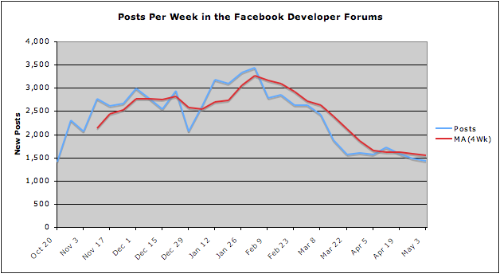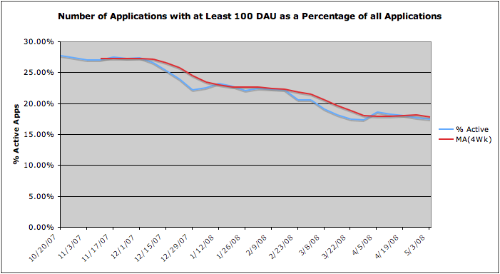The State of the Facebook Platform
Something is wrong in the Facebook developer community. Starting in March I began noticing that the level of activity in the Facebook developers forum was dropping sharply.
But it's numbers that matter, not vague impressions, so does the data back me up? Is the Facebook developer community retreating from the public space of the forums? The answer is yes, on both accounts.
Looking at five key metrics we'll see that the activity level of the Facebook forums is a fraction of what it was at the beginning of 2008. The number of active usersAn "active user" is defined as someone who has made at least one post in the period being considered. Here, a month has declined 27% since January, for example. And this is the best-performing metric discussed.
Furthermore, this decline in forum activity correlates to an overall decline in activity on the Facebook platform. Applications launched in early January were on average 1.5 times more successful than applications launched at the end of March.
The turning point occurred in early February where several interlocking factors came into play. First, Facebook finally saw real competition in the form of other social networking platforms, particularly Hi5.
Second, Facebook started instituting increasingly demanding and arbitrary rules on platform developers, which they then enforced selectively and for their own benefit.
Third, a trend of application consolidation began and accelerated through March, locking up developer resources inside private companies.
Contents
What is Activity?
You can define activity in a lot of ways and I tried to be as liberal as possible. The Facebook forums have three main objects worth measuring: users, threads, and posts.
The forum is "active" when users are signing up and creating new threads and posts. To measure this I created a script in Ruby that can scrape any PunBB-based forum, like the Facebook forum. This basically results in a local copy of the forum database.
I then broke the data down in two ways. In the first I compare the activity in Janurary 2008 to the activity in April 2008. In the second I break down all activity from the launch of the forum in October 2008 through April 2008 on a weekly basis.
Disclaimer: I'm the creator of Adonomics, a key player in the Facebook platform ecosystem, although I no longer work for the company that now owns it.
The Data
| Monthly Statistics for the Facebook Developer Forum | |||
|---|---|---|---|
| Month: | Jan 2008 | Apr 2008 | |
| Posts per day | 461 | 225 | -51% |
| Signups per day | 38 | 27 | -29% |
| Threads per day | 80 | 44 | -44% |
| Active users | 1,606 | 1,168 | -27% |
| Highly active users | 461 | 225 | -47% |
An "active user" is defined as someone who makes at least one post in that month. A "highly active user" is defined as someone who makes at least five posts in that month. The per day metrics are averaged over the number of days in each month.
The big picture doesn't look so good. But is the lower level of activity in April just a fluke or has this been a consistent trend? Let's extend the timeline from October 2007 to April 2008 and take a look at these metrics on a weekly basis.
The Trend
I'm going to post weekly graphs for only three metrics: posts per week, signups per week, and active users per week. The other two metrics show the same trends.
Each graph contains the weekly data plus a red line that represents a four-week moving average. This is to remove any noise produced from dips or spikes in activity and reveal the actual trend.
You can look at the graph for weekly active users, too, but it exhibits the same downward trend.
Analysis and Hypotheses
These graphs show the two main trends for the Facebook developers forum: engagement peaked in late-January while new signups have continually dropped since the launch of the forum.
In fact, since the start of 2008 we've seen 3.4% week over week decline in new posts. For new signups and active users these numbers are 1.7% and 0.8%, respectively.
The other metrics, new threads and highly active users, show the same downward trend.
Why has there been a steady, three-month decline in activity on the Facebook developer forum? What explains the peak in late-January?
- Other platforms are more attractive
-
Since Janurary several other social networks have launched their own platforms. Those based on OpenSocial are wholly incompatible with Facebook and so far Bebo is still the only company to launch using Facebook's architecture for their base.
This means developing for other networks becomes an either-or proposition. Coding on OpenSocial precludes me from spending that time coding for Facebook. Hi5 and MySpace, in particular, are interesting because they potentially offer the huge growth opportunities that developers saw in the first six months of the Facebook Platform.
- Developers are consolidating
-
Networks like Zynga and Social Gaming Network (SGN) have cropped up in the last few months and have made it their business to consolidate the game space on Facebook, probably the only real vertical that has found success on the platform. Bigger companies like Slide and RockYou have been actively recruiting from the Facebook developer pool all along, too.
Perhaps the open community that existed four months ago is closing up. Developers working for the same company talk to each other rather than on the forums, and developers working for different companies don't want to talk in public for competitive reasons.
- Facebook has made it too hard to win
-
Starting in the middle of January Facebook began instituting ad hoc solutions to curb the spread of abusive and spammy apps. The side-effect of these measures is to make it harder for applications to spread.
These measure include banning the word "message" from news feed items, disallowing passive news feed stories, instituting feedback-based request and notification limits, and banning "forced invites."
The ad hoc and arbitrary nature of these rules makes it hard to keep up because Facebook generally gives less than a week's notice. This only serves to increase the relative cost of developing on the Facebook platform.
This is not to forget mini-scandals like the Facebook/CBS partnership, where Facebook removed invite restrictions on CBS' sponsored March Madness application, even though there were other, independent applications in the same category. It's hard to say how this affected developer morale, but it showed that Facebook was willing to hurt independent developers when it benefitted them.
One other possibility is that the external developer resources are now rich enough that people have to spend less time asking questions. This might be a contributing factor but is probably not a critical one given that the decline beginning in late-January is so well-defined.
Facebook Application Data
If it's true that winning on Facebook is not as easy as it used to be then that should be reflected in the application statistics. How can we measure this?
Success, for most developers, is defined as attaining a certain level of activity within a specific timeframe. There are two ways to measure this: one, take time-based cohorts of applications (e.g., all applications started in the same week) and measure their average level of activity some number of weeks later; two, measure the number of active applications as a percentage of the total application space over time.
I will do both. For the first I'm going to take weekly cohorts and measure their average level of activity three weeks later. That is, I am going to group all applications by the week they were launchedReally, I am going to group them by the week they began to be tracked by Adonomics. and see how they were doing three weeks laterThree weeks is arbitrary, but you can look for yourself — we see the same trend whether it's one week, two weeks, three weeks, or four weeks.
For the second I am going to measure the number of applications with at least 100 daily active users (DAU)Again, 100 is arbitrary, but we see the same trend whether it's 10, 100, or 1,000. as a percentage of the total number of applications on Facebook.
Here are the graphs.
These exhibit the same trends as the data from the Facebook developer forums.
Conclusions
Correlation is not causation, of course, so we can't say whether the decline in developer activity means less application activity, if developers are leaving because applications are no longer as successful as they used to be, or whether there is an unknown factor causing both of these phenomena.
What we can say is that the vitality of both the Facebook developer community and the Facebook platform is not what it was even four months ago, and that these two phenomena are closely related.
Moreover, talking to developers and investors inside the industry it's clear that the excitement over the Facebook Platform and its promise have waned. Application companies are branching out to other social networks not because they necessarily show more promise than Facebook, but because the future of the Facebook Platform has become murky.
Nobody knows how committed Facebook is to improving the platform or the role applications are meant to play in the overall Facebook ecosystem. Signals like the reduced level of direct participation in the developer community, increasingly restrictive developer policies, and the Facebook profile redesign seem to indicate that they are trying to regain control over some, if not all, aspects of application development while maintaining an aloof demeanor towards developers.
It boils down to this: investing most of your man-hours into Facebook at this point in time is a mistake. The potential return on that investment, a year after launch, is a fraction of what it once was. And the fact that Facebook continues to change the rules and selectively break them for their own benefit means the risk is comparatively higher.
It is better to branch out into other social networks or to piggy-back on Facebook as a means to establish your own, more independent social network. This is what the top companies like Slide, RockYou, Zynga, and SGN are doing, and what many of the independent Facebook developers I've talked with want to do.
The luster of the Facebook Platform might be gone, but that doesn't mean there aren't opportunities in the space. I just wouldn't go looking for them at the other end of Facebook's newsfeed.
Misc.
All application data courtesy of Adonomics. A spreadsheet containing the forum data is also available under a Creative Commons Attribution License, below.



